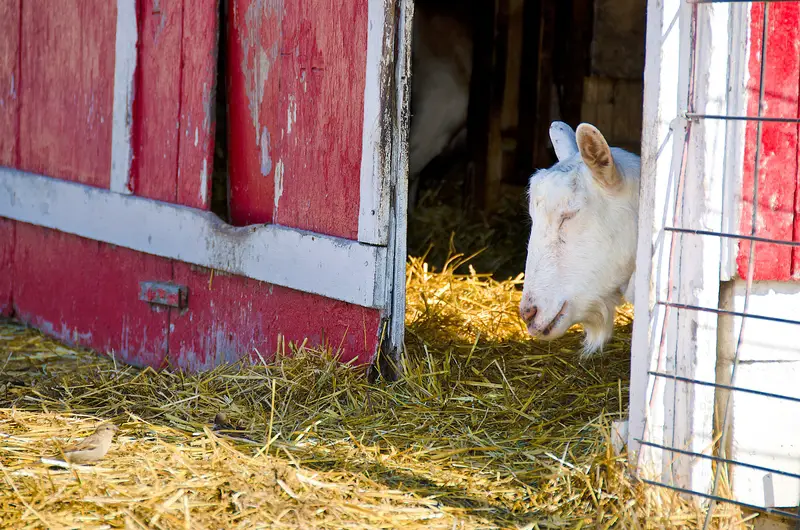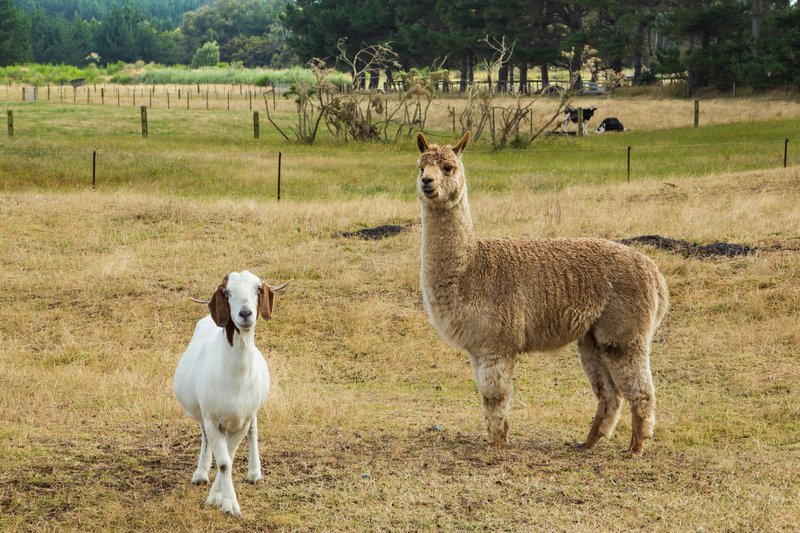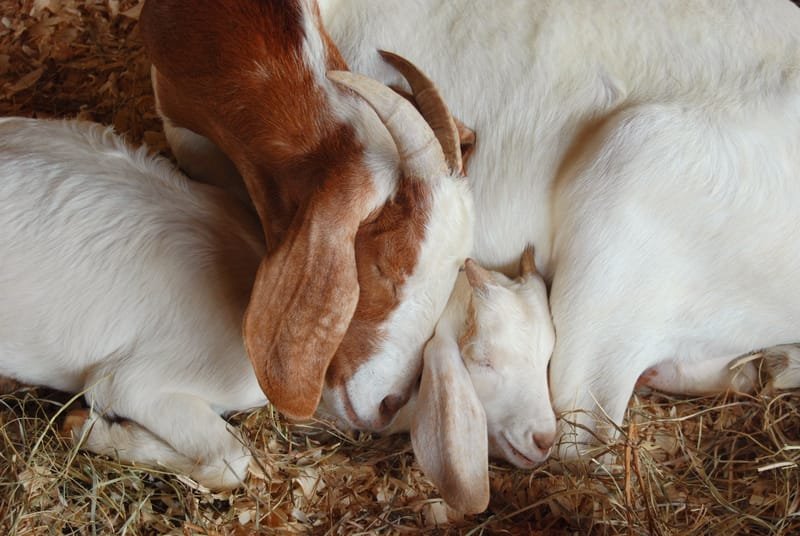This post contains affiliate links.
Keeping goats can be an excellent choice for small farmers or homesteads with a few acres of land. Keeping these hardy animals for dairy or meat is becoming more popular because they don’t have in-depth caring needs. They do, however, have specific housing and shelter needs. The big question most new goat owners have is can goats stay out at night?
Goats are tough animals that do fine inside or outside; if there is proper fencing and shelter, goats can stay out at night. You will need to ensure their shelter’s perimeter, and interior fencing is predator-safe. Some goats want to sleep locked inside at night, and others want to sleep outside.
There is some debate on this subject, so I spoke to a few goat farmers. There are two distinct camps here; one side says goats need to be kept inside at night, and the other side says that goats are fine staying outside. I will discuss what the reasons are for both sides whether goats should be kept outside or inside at night.

Can Goats Stay Outside At Night?
There is a lively debate around the topic of goats inside or outside at night. So here is a breakdown of opinions from both sides.
Keeping Goats Outside At Night
Many farmers state that their goats prefer to stay outside at night and not in a barn or outbuilding. Goats have a thick layer of hair that grows close to their skin and don’t get that cold during the fall and winter.
The important thing you need to remember if you decide to keep the goats outside is to ensure they stay dry and shelter them from the snow, wind, and rain. Most farmers build a three-sided shelter to ensure they are safe from the elements.
Keep in mind that goats don’t like to sleep directly on the ground because they hate anything that can get them wet, like rain, wet floors, and muddy puddles. Farmers and homesteaders usually put down either clay, concrete, wooden or plastic pallets as flooring and bedding. You can also add hay to keep them warmer in cold or rainy weather.
You can also build a corner shelf as bedding for pregnant/lactating does and kids. It helps keep the does and their kids close and makes feeding time much easier as there is enough space to fit the doe and her kids on the shelf for feeding time.
The Exception For Goats Staying Outside
The experts, farmers, and homesteaders all agree that the one exception for keeping goats outside is kids (baby goats), and pregnant or lactating does. These goats won’t be able to defend themselves properly and need to be kept inside a locked shelter at night.
If you are concerned about your goats staying warm enough in winter, check out my article, Do Goats Need Heat In The Winter? Tips to Keep them Healthy.
Factors To Remember If Your Goats Are Outside At Night
When you decide to keep your goats outside with a shelter at night, there are certain factors that you need to keep in mind to ensure your goats stay safe and healthy.
Ensure Extra Food Requirements Are Met
At night when the temperature drops, your goats will have a metabolic shift. Their metabolic rate will increase, meaning they will burn more calories and need to replace them. So ensure you leave extra food out for your goats.
Ensure The Shelter and Fencing Is Predator Proof
One of the main concerns of keeping goats outside is the risk of theft and predator attacks. You can minimize this risk by ensuring the goat shelter and fencing is high enough so the goats can’t get out (like they are known to do) and predators and thieves can’t get in.
The fence also needs to be installed at least three feet in the ground to ensure predators like foxes don’t dig under the fencing to get to the goats. For more information on building a fence for your goats read my article, How Tall Of A Fence Do You Need For Goats?
Ensure The Shelter Is Weather Proof
As I stated in the previous section, it is vital to keep your goats out of the rain, snow, and wind as they can get sick. Goats hate getting wet and seek shelter at the first sign of rainfall. They also battle to regulate their body temperature when their extra layer of fur gets wet.
Using scrap wood and recycled materials, you can build an easy and adequate shelter for your goats at home. Goat shelters don’t need to be fancy; they only need to keep the goats and their food dry and warm. You can raise the sleeping area by giving them a shelf or pallet with hay as bedding to sleep on at night out of the elements.
Keeping The Yard Clean
As we know, predators are attracted to food, so if you have trash heaps or trash bins, keep them as far away from your goats as possible. It’s the same if you have piles of leaves or a compost heap in your yard. Predators will smell the food in the trash bins and hide as close as possible to get to your goats.
Consider Getting A Livestock Guardian/Protector For Your Goats
One way to keep your goats safe is to get goat guardians. There are a few hardy animals that can safely live with your goats. You can put animals like alpacas or dogs in the same pen as the goats. They will protect the goats from any predator or human that tries to harm them; if not, they will make enough noise to ensure someone knows something is wrong.

Keeping Goats Locked Inside A Shelter At Night
On the opposite side of the situation are the farmers, homesteaders, and some livestock experts that say goats may have the extra layer of fur intended to keep their body temperature stable. Still, they can get sick if left outside at night.
An expert in livestock says that goats need to be kept indoors at night, especially in cold or rainy weather. She explains that goats have a temperature of 101.5 – 104 Fahrenheit and use a metabolic response to balance their temperature to suit their environment.
The metabolic shift then causes a homothermic response that helps the goats keep their body temperatures within their normal range. Goats can withstand temperature changes that vary between 54 – 75 degrees Fahrenheit (12-24 degrees Celcius), but in extreme situations, they can survive in temperatures as low as 32 degrees Fahrenheit (0 degrees Celcius).
She further explains that while they have the extra fleece or fur to balance their temperatures, they are susceptible to cold and rainy conditions. She suggests that goats need adequate shelter to keep them safe and warm.
Reasons To Keep Your Goats In A Shelter At Night
While most people agree that keeping goats outside is not the worst choice, there are some cases where it’s best to keep the goats locked up at night.
The Weather Conditions
Weather conditions can lead to sickness and death in goats if they are left outside in the elements. Because goats hate water, if you live in an area with heavy rainfall, you will need to build a sloping roof so that the rain and the snow will go to the back of the shelter.
If the weather conditions in your area become hot and humid during the summer, it’s essential to have a shelter that provides shade. Like many other animals, goats can get heatstroke when temperatures rise and need to keep cool during the summer months. Shaving the extra fur of a goat will also help in hotter months. Learn more about shaving a goat in my article, Is It Okay To Shave A Goat?
Safety Concerns
As stated above, safety concerns are there regardless of if your goats are outside or inside at night. Predators and humans will try to attack or steal your goats, and you need to have a system in place to alert you when something like this happens. Keeping companion animals is one way to do this.
Remember, not all predators are big. Pests like rats and mice won’t catch a goat and drag it off, but one bite from these pests might cause severe damage as they carry diseases that can spread to other animals.
Another way is to install a motion-activated alarm and camera system. It will scare off most humans and predators. The moment the motion detectors catch motion outside the goat shelter, the alarm goes off, and the camera and lights turn on. This system can save your goats.
Pregnant/Lactating Does and Kids
The most vulnerable goats in any goat herd are the mothers and babies; goats are no exception. Does and their kids or pregnant does are at risk of predators and human theft, and the weather is also a concern. They can get sick if exposed to the elements.
If they went into labor in the middle of the night, they would be safer inside than outside. The safety and warmth will keep them calm. They will be able to recover quicker if they are out of the elements and can sleep and rest.
Lactating goats need to be kept inside with their kids as well. They are vulnerable to the elements and predators as they have to feed their kids and can’t be on guard all the time.

Tethering Goats Outside Night Or Day
The one big mistake people sometimes make when they are new to raising goats is to tether them. Goats have a tendency to climb and jump and are notorious for escaping from their shelters but tethering them is not a good solution.
Reasons tethering a goat is a bad idea:
- Tethering your goat might lead to strangling.
- Tethering your goat might cause entanglement if they get too active.
- The goats won’t be able to escape bad weather.
Tips For Keeping Goats Safe At Night
Goats are expensive to replace, regardless of why you have them, but there are some handy tips to help you keep them safe at night.
- Keep the watering troths as far away from the sleeping area as possible. When the temperatures drop, the water will get cold, and any bedding or walls close to the troths will get colder.
- Use recycled or scrap material to build shelters. Goats don’t need elaborate structures to keep them happy, so don’t go out and buy the most expensive shelters when you can quickly create an adequate shelter for their needs, for much less.
- Using corner shelving as bedding stations will keep the goats warmer and give enough room for does and their kids to sleep together safely.
- If you have predators galore in your area, you might want to invest in an electric fence. It will give added protection and keep your goats safe.
- Keep a close eye on pregnant does. Clean up quickly after goats give birth as the smell draws predators. If you clean up quickly and remove any soiled hay, it will draw less attention to your goats and the new arrivals.
- Ensure to keep enough food out in the winter months to compensate for the extra calories that goats tend to burn when regulating their body temperature.
- If you have dairy goats, build a milking area safe from the elements. The last thing anyone wants is being exposed to the elements while milking.
- Keep in mind that goats are Houdinis and love to escape any sheltered area by climbing the fence. So, you need to ensure it’s high enough to keep them safely inside at night.
- Slope the roof of your shelter so the rain will run down to the back of the structure. It helps keep goats dry as they hate getting wet or sleeping on damp ground. You can also build the shelter floor at an angle to allow for proper drainage.
Final Thoughts
The decision to keep goats inside or outside at night is a personal preference. Your choice will be unique to your situation, local weather, and the type of goats you have. Some goats love staying out at night, and others prefer to stay inside.
Regardless of their preference, it would be best to keep does with kids or pregnant does indoors at night as the risk is too big for them to be outdoors. As long as proper precautions are taken to keep the goats safe, warm, fed, and away from the elements and they have access to a shelter where they can go if there is bad weather, they should be fine.

